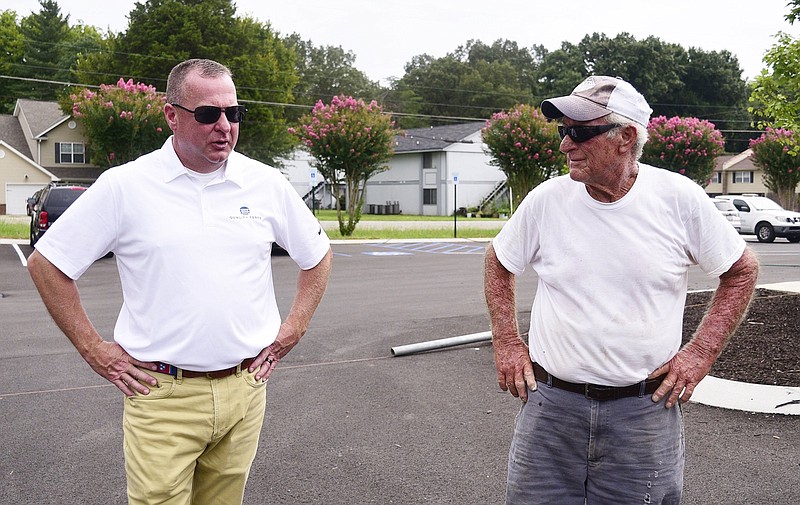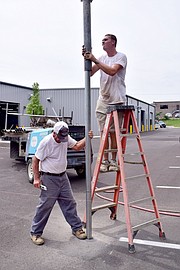When Bobby Winnie and John Owen bought Quality Fence Company in July, they got more than just a 44-year-old business with a loyal stable of clients and a rock-solid reputation. They also got Rondell Robinson.
"I could go ahead and retire, but I really don't want to," says Robinson, who is 78 and has worked since 1977 for the company his older brother, Wendell Robinson, founded.
"I enjoy doing it all," Rondell says. "I come out and dig the holes and string the wire and set the posts. I guess I get tired a little bit, but that's OK."
Keeping Rondell on the job has been one of the best things about buying the business, Winnie says, and building on the legacy the Robinsons established is his goal.
"Wendell's character and his story was what made us want this place - he founded it and ran it for years," says Winnie, 51.
He doesn't want to change what the business does, but he does want to modernize operations and "market the fire out of it," Winnie says.
"With the housing boom that's taking off in this market right now, the demand for fencing is crazy," he says. "Six months ago, I didn't know the first thing about a fence. Since word got out, my phone rings off the hook. There's demand out there that's not being met."
The Next Generation
* Baby boomers (born 1946 to 1964) are 57 to 75 years old* Boomers own about two-thirds of the roughly four million U.S. businesses with employees* Those businesses employ more than 25 million peopleSource: U.S. Census Bureau
As baby boomers - and the traditionalist generation who came just before them - age into retirement, millions of small businesses and trillions of dollars in wealth are going on the block and into the hands of younger owners.
Baby boomers, born 1946 to 1964, are now 57 to 75 years old, number more than 70 million, and own about two-thirds of the roughly four million U.S. businesses with employees, according to the U.S. Census.
But the transfer of wealth and business ownership is about more than just numbers. For many sellers, these businesses are their legacies, not just their livelihoods.
"I feel like I'm a psychologist half the time," says Kyle Bryant, a co-founder of Market Street Partners, which is starting a new consulting service brokering these small-business hand-offs. "The size of businesses we're dealing with, it is their life."
Market Street Partners, which helped broker the Quality Fence Company deal, specializes in mid-sized, $5 million to $20 million transactions, Bryant says.
"That's one of our niches, and one of the reasons we've grown so much," he says. "We're seeing in the market there is this generational shift. We have seen people in their 70s and 80s that have zero plan for what they're going to do in terms of succession."
And the urge to hang on to their careers is powerful in baby boomers and traditionalists, Bryant adds. His own father is in his mid-70s, and is a physical therapist still working full time.
"That's his generation," says Bryant, 37. "Their identity is wrapped up in what they're doing."
Andy Stockett, managing director at FourBridges Capital Advisors, is one of the firm's founding partners, and a baby boomer himself at 65.
The business deals FourBridges brokers run the gamut, and have included the sale of local mainstays Junior's Building Materials in July and Rock/Creek Outfitters in 2018. The businesses they deal with are often manufacturing and service-based, and born from the skills and interests of their founders, Stockett says.
"We think about the guy who, 30 years ago, got laid off at the factory and started bending metal in his garage and the next thing you know he has a $25 million to $30 million company," Stockett says. "The kids don't have an interest and he has to figure out an exit."
These deals come down to a lot more than dollars for many sellers, Stockett adds.
"Typically, that seller wants and expects that we'll give him a strong value for everything he's built, but he also wants to leave the legacy for their customers and employees," he says. "They like to have top dollar, but we've had several instances where people didn't take top dollar because the chemistry was better with another buyer."
In many cases, the role of the broker in these deals is just as much personal counselor as it is number-cruncher, Stockett says.
"We tell people who are struggling with actually selling, 'It will be better for you, your family, your employees and customers if you go ahead and take the reins and do this in a logical process rather than you have a health issue where no one knows what to do,'" he says.
On the flip side, he says, it's important that owners really think through a plan for their lives post-sale.
"You have to make sure you understand what life looks like after you do this, because a lot of them, they've been consumed with it for their whole career," Stockett says. "You can only play so much golf."
Ben Brown, 39, runs Alderman Enterprises with business partner Chris Wright, 36. Alderman specializes in buying businesses with $3 million to $15 million in revenue, and owns four manufacturing and industrial companies, all based in Chattanooga.
Brown and Wright, who have backgrounds in business finance and operations, founded Alderman six years ago, and they have learned a lot in that time about the tactics and nuances of buying businesses from baby boomers and traditionalists, Brown says.
"Everyone has been talking about the baby boomer retirement wave for a long time, and now if you look at the data, the boomers are starting to hit 70 en masse," he says. "As a generation, they like to work. They weren't looking to hit 65 and hit the exits. We talk to plenty of folks who said, 'I'm going to die at my desk with pride.'"
One example of that phenomenon came when they bought Combustion and Control Solutions from its two founders in December 2020. One of them retired, but the other one is still deep in the day-to-day work of the business, Brown says.
"He's happiest under a boiler," Brown says.
Buying from founders who are decades older than the new business owners requires a careful balance, Brown says.
"There's some stereotyping: 'Are you one of these millennials, and you think it's easy street and this is hard work, this is blue-collar work, and there's pride in it,'" Brown says. "Sometimes there's a perception that I might not be able to appreciate what they do, and the importance of what they do, but we absolutely recognize how important they are and essential and treat them with respect."
When it comes to facilitating deals between older business founders and the younger buyers he's typically working with, there can be cultural challenges, Stockett says.
In one case, a 78-year-old founder of a heavy machinery business in Alabama was sitting at the table with a private equity group that included a 27-year-old "freshly minted MBA," Stockett says.
"Finally, he just couldn't help himself, he leaned over and looked at my client and said, 'Can you give me any idea of the metrics you use in the business,' and my client said, 'Sonny, we use yards and inches down here. We don't use metrics,'" Stockett laughs. "This is why I exist, is to translate."
Building for the Future
Patrick Wells, 35, was a member of Alderman Enterprises when the company acquired 30-year-old Majestic Stone in 2016.
Now the CEO of Majestic, Wells has thrown all his time and energy into learning the stone business and growing the company, but he's not driven by the same passions that drove the original founders a generation ago, he says.
"They started this stone business because they love the stone, the beauty of the stone," Wells says. "I don't necessarily love the stone business. It was more about an opportunity to own and run a business. I've got to believe in the product or service - it has to add value, be high quality, make a difference from a product standpoint, but that's in stark contrast to the founders."
Strong fundamentals were what made him want to run and grow Majestic, Wells says.
"When we were looking at the company, the thing that really stood out to me was it had great people in place - good bones, a good customer base, good equipment," he says. "It needed a fresh direction and vision and passion behind it."
He has been able to double the size of the business, and plans to keep growing, Wells says.
"Instead of just a small mom-and-pop, we were able to take those bones and go after some national distributors, create a national private label," he says. "We were able to reinvest in equipment to grow capacity."
Another local company, Horizon Stone, purchased Majestic from Alderman Holdings in 2019. Joining forces with Horizon Stone further enabled growth, Wells says. Horizon is a strong, multi-generational company that specializes in manufactured stone, while Majestic focuses on natural stone, he says.
Gaining the partnerships that came with that deal was invaluable, he adds.
"Here I am at Majestic growing this company, and I knew we had a lot of room to grow, but I knew that to really get Majestic where I thought it could be I was going to need some more industry experience," Wells says. "I needed some help outside of my own knowledge and our private equity group's knowledge."
That outsider perspective can create challenges, but it can also be a blessing in evaluating the potential of a business, he adds.
"If you didn't start the company, you don't have all these biases, you don't have all these growing pains and all this heartache," Wells says.
Generations at Work
* Traditionalists or Silent Generation: Born 1928-1945. (ages 76-93)* Baby Boomers: Born 1946-1964. (ages 57-75)* Generation X: Born 1965-1980. (ages 41-56)* Millennials: Born 1981-1996. (ages 25-40)* Gen Z: Born 1997-2015. (ages 6-24)Source: Pew Research
He has dedicated resources to building the company's brand and developing a stronger online presence, which is crucial to growth, Well says.
"That's a lot of what our generation is doing," he says. "My parents and grandparents, they think it's silly. 'All you guys do is build a website and do some Facebook stuff.' There's more to it than that."
Building the brand consistency and online presence of Quality Fence Company is one way Winnie hopes to grow the business, he says. When he heard the owner of Quality Fence Company was looking for a buyer, he did some research.
"I went and read every review online, and I saw a 40-plus year history in the community, an amazing reputation," Winnie says. "That piqued my interest."
Winnie knew he could handle operations and a lot of the financial work, but he felt he needed a strategy person to help with long-term planning. He called his longtime friend Owen, who is the president and CEO of SimplyBank.
"I reached out to him and said, 'I've come across this amazing opportunity and I can run it day-to-day, but I could use some help with vision and other financial advice," Winnie says. "We partnered up and rolled with it."
Owen, 42, has years of experience building and selling businesses, and is either a young member of Gen X or an older member of the millennial generation, depending on which definition he's working with. Owen, however, feels aligned generationally with business partner Winnie, who is squarely in Gen X, and he blanches a little at the term 'millennial.'
"There's not a millennial bone in my body," Owen says, laughing. "Bobby and I are probably more similar, but with my business experience, I feel about 65."
READ MORE
* Generations on the clock: How when we're born shapes how we work


